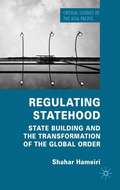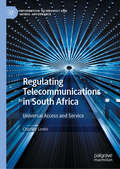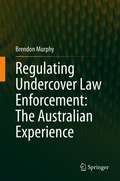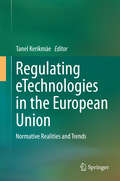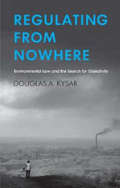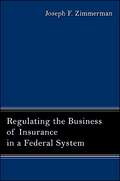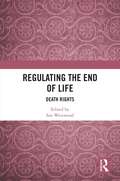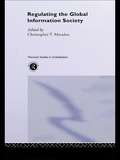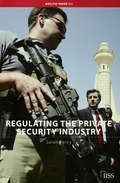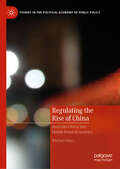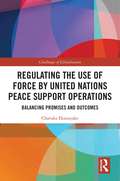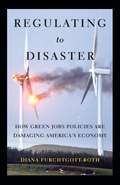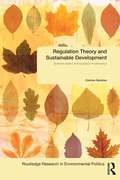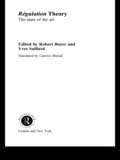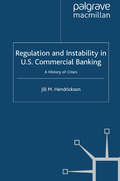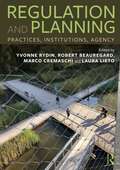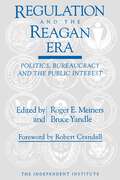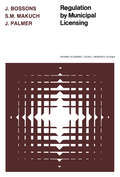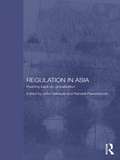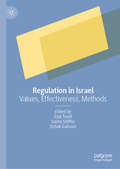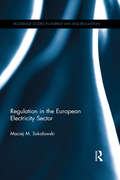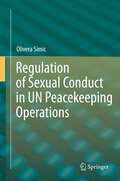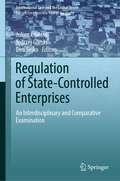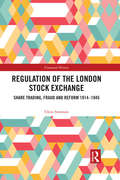- Table View
- List View
Regulating Statehood: State Building and the Transformation of the Global Order
by Shahar HameiriShahar Hameiri argues that state building interventions are creating a new form of transnationally regulated statehood. Using case-studies from the Asia-Pacific, he analyzes the politics of state building and the implications for contemporary statehood and the global order.
Regulating Telecommunications in South Africa: Universal Access and Service (Information Technology and Global Governance)
by Charley LewisThis book provides the first full account of the 20-year story of universal access and service in South Africa’s ICT sector. From 1994 the country’s first democratic government set out to redress the deep digital divide afflicting the overwhelming majority of its citizens, already poor and disenfranchised, but likewise marginalised in access to telephone infrastructure and services. By this time, an incipient global policy regime was driving reforms in the telecomms sector, and also developing good practice models for universal service. Policy diffusion thus led South Africa to adopt, adapt and implement a slew of these interventions. In particular, roll-out obligations were imposed on licensees, and a universal service fund was established. But an agency with a universal service mandate was also created; and licences in under-serviced areas were awarded. The book goes on to identify and analyse the policy success and failure of each of these interventions, and suggests some lessons to be learned.
Regulating US Private Security Contractors
by Jovana Jezdimirovic RanitoThis book explores different aspects of the regulation of private security contractors working for governments. The author specifically examines the US, identifying the obstacles that have hindered US regulatory outcomes. Theoretical discussions, supported by conceptual analysis of Bourdieu’s Theory of Practice, are applied to analysis based on interviews with current and former employees of key stakeholders. By analyzing the political, bureaucratic, and organizational obstacles to the implementation of consistent and enforceable regulations, Jovana Jezdimirovic Ranito points to creative possibilities for future use of her conceptual framework.
Regulating Undercover Law Enforcement: The Australian Experience
by Brendon MurphyThis book examines the way in which undercover police investigation has come to be regulated in Australia. Drawing on documentary and doctrinal legal analysis, this book investigates how, in the space of a single decade, Australian law makers set out to regulate one of the most difficult aspects of police: undercover investigation. In so doing, the Australian experience represents a paradigm model. And yet despite its success, it is a system of law and practice that has a dark side – a model of investigation to relies heavily on activities that are unlawful in the absence of authorisation. It is a model that is as much concerned with the surveillance and control of police as it is with suspected criminal conduct.The book aims to locate the Australian experience in comparative perspective with other major common law jurisdictions (the United Kingdom, Canada and New Zealand), with a view to contrast strengths, similarities and weaknesses of these models. It is argued that the Australian model, at the pragmatic level, offers a highly successful model for regulatory structure and practice, providing a significant model for successful regulation. At the same time, the model that has been introduced raises important questions about how and why the Australian experience evolved in the way that it did, and the implications this has for the relationship between citizen and state, the judiciary and the executive, and broader questions about the protections offered by rights discourse and jurisprudence. This book aims to document the law, policy and practices that shape undercover investigations. In so doing, it aims to not only articulate the way in which the law regulates these activities, but also to move on to consider some of the fundamental questions linked to undercover investigations: how did regulation happen? By what means of regulation? What are the driving policy issues that give this field of law its particular complexion? What are the implications? Who gains, and who loses, by which means of power?The book offers unique insights into a largely unknown aspect of modern covert policing, identifying a range of practices, the legal framework, controversies and powers. By locating these practices in a rich theoretical context, informed by risk and governmentality scholarship, this book offers a legal and theoretical explanation of one of the most controversial forms of policing.
Regulating eTechnologies in the European Union
by Tanel KerikmäeThe EU strategy 2020 includes ambitious plans for e-regulation that could improve Europe's competitiveness. However, the European states have very different legal frameworks in this field. This book introduces flagship initiatives and provides a detailed overview and analysis of the current standards and latest developments, offering practical insights and guidelines for practitioners and policy-makers alike. Further, as it discusses the main areas of e-regulation, it can serve as a useful platform for university education in light of the growing need for new kinds of specialists, i. e. IT lawyers. The book concentrates on fields that are directly affected by e-regulation such as cyber-security, databases, computer programs, e-governance, IP and competition law and informatics.
Regulating from Nowhere: Environmental Law and the Search for Objectivity
by Douglas A. KysarDrawing insight from a diverse array of sources -- including moral philosophy, political theory, cognitive psychology, ecology, and science and technology studies -- Douglas Kysar offers a new theoretical basis for understanding environmental law and policy. He exposes a critical flaw in the dominant policy paradigm of risk assessment and cost-benefit analysis, which asks policymakers to, in essence, "regulate from nowhere. " As Kysar shows, such an objectivist stance fails to adequately motivate ethical engagement with the most pressing and challenging aspects of environmental law and policy, which concern how we relate to future generations, foreign nations, and other forms of life. Indeed, world governments struggle to address climate change and other pressing environmental issues in large part because dominant methods of policy analysis obscure the central reasons for acting to ensure environmental sustainability. To compensate for these shortcomings, Kysar first offers a novel defense of the precautionary principle and other commonly misunderstood features of environmental law and policy. He then concludes by advocating a movement toward environmental constitutionalism in which the ability of life to flourish is always regarded as a luxury wecanafford.
Regulating the Business of Insurance in a Federal System
by Joseph F. ZimmermanIn Regulating the Business of Insurance in a Federal System, Joseph F. Zimmerman provides an up-to-date historical description and analysis of the regulation of the business of insurance in the United States. He focuses on the controversial issue of whether Congress should authorize optional federal charters for insurance companies, thereby establishing a dual charter system superficially similar to the dual banking system. Reviewing the evidence between federal and state level regulation of the financial securities industry, Zimmerman finds that federal regulation falls woefully short of its state counterpart. He concludes that the current system, rather than the proposed dual insurance regulatory system, is the most efficient and effective.
Regulating the End of Life: Death Rights
by Sue WestwoodDeath Rights is a collection of cutting-edge chapters on assisted dying and euthanasia, written by leading authors in the field. Providing an overview of current regulation on assisted dying and euthanasia, both in the UK and internationally, this book also addresses the associated debates on ethical, moral and rights issues. It considers whether, just as there is a right to life, there should also be a right to death, especially in the context of unbearable human suffering. The unintended consequences of prohibitions on assisted dying and euthanasia are explored, and the argument put forward that knowing one can choose when and how one dies can be life-extending, rather than life-limiting. Key critiques from feminist and disability studies are addressed. The overarching theme of the collection is that death is an embodied right which we should be entitled to exercise, with appropriate safeguards, as and when we choose. Making a novel contribution to the debate on assisted dying, this interdisciplinary book will appeal to those with relevant interests in law, socio-legal studies, applied ethics, medical ethics, politics, philosophy, and sociology.
Regulating the Global Information Society (Routledge Studies in Globalisation)
by Christopher T. MarsdenAn outstanding line-up of contributors explore the regulation of the internet from an interdisciplinary perspective. In-depth coverage of this controversial area such as international political economy, law, politics, economics, sociology and internet regulation. Regulating the Global Information Society covers the differences between both US and UK approaches to regulation and establishes where policy is being made that will influence the future direction of the global information society, from commercial, democratic and middle-ground perspectives.
Regulating the Private Security Industry: Regulating The Private Security Industry (Adelphi series)
by Sarah PercyThe under-regulation of the private security industry has increasingly become a topic of media and academic interest. This Adelphi Paper enters the debate by explaining why the industry requires further regulation, and what is wrong with the current system. It begins by briefly defining the industry and explaining the need for more effective regulation, before analysing three types of regulation: domestic, international and informal (including self-regulation).
Regulating the Rise of China: Australia’s Foray into Middle Power Economics (Studies in the Political Economy of Public Policy)
by Michael PetersThis book revises the existing account of the first Rudd Government's engagement with China, placing Australian foreign direct investment screening policy at the centre of the story. At the time, the Rudd Government was accused of holding an unnecessarily interventionist approach to Chinese Sovereign-Owned Enterprise investments into the Australian mining sector. This book claims that the Australian Government had a deep and coherent understanding of the problem posed by Chinese investments that went well-beyond any simplistic 'China Inc.' or geopolitical threats. The key policymakers believed that the Chinese state-directed investments threatened the integrity of the liberal governance structures on which the Australian state is founded, and so Australian sovereignty itself. While the response of the Rudd Government was largely ineffectual, the logic underpinning it remains the best framework for guiding Australia's engagement with China into the 2020s, as well as the engagement of other liberal states coming to grips with China's rise.
Regulating the Use of Force by United Nations Peace Support Operations: Balancing Promises and Outcomes (Challenges of Globalisation)
by Charuka EkanayakeThis Book attempts to deduce regulatory standards that can close the gaps between the Promises made and the Outcomes secured by the United Nations in relation to its use of force. It explores two broad questions in this regard: why the contemporary legal framework relevant to the regulation of force during Armed Conflict cannot close the gaps between the said Promises and Outcomes and how the ‘Unified Use of Force Rule’ formulated herein, achieves this. This is the first book to coherently analyse the moral as well as legal aspects relevant to UN use of force. UN peace operations are rapidly changing. Deployed peacekeepers are now required to use force in pursuance of numerous objectives such as self-defence, protecting civilians, and carrying out targeted offensive operations. As a result, questions about when, where, and how to use force have now become central to peacekeeping. While UN peace operations have managed to avoid catastrophes of the magnitude of Rwanda and Srebrenica for over two decades, crucial gaps still exist between what the UN promises on the use of force front, and what it achieves. Current conflict zones such as the Central African Republic, Eastern Congo, and Mali stand testament to this. This book searches for answers to these issues and identifies how an innovative mix of the relevant legal and moral rules can produce regulatory standards that can allow the UN to keep their promises. The discussion covers analytical ground that must be traversed ‘behind the scenes’ of UN deployment, well before the first troops set foot on a battlefield. The analysis ultimately produces a ‘Unified Use of Force Rule’, that can either be completely or partially used as a model set of Rules of Engagement by UN forces. This book will be immensely beneficial to law students, researchers, academics and practitioners in the fields of international relations, international law, peacekeeping, and human rights.
Regulating to Disaster
by Diana Furchtgott-RothWhat is a "green job" anyway? Few can adequately define one. Even the government isn't sure, you will learn in these pages. Still, President Obama and environmentalist coalitions such as the BlueGreen Alliance claim the creation of green jobs can save America's economy, and are worth taxpayers' investment.But in Regulating to Disaster, Diana Furchtgott-Roth debunks that myth. Instead, energy prices rise dramatically and America's economic growth and employment rate suffer - in some states much more than others - when government invests in nonviable ventures such as the bankrupted Solyndra, which the Obama Administration propped up far too long.Electric cars, solar energy, wind farms, biofuels: President Obama's insistence on these dubious pursuits ultimately hamstrings American businesses not deemed green enough, and squeezes struggling households with regulations. Adding insult to injury: the technology subsidies Americans pay for solar panels, wind turbines, and electric batteries really help create manufacturing jobs in China and South Korea.Green jobs are the most recent reappearance of a perennial bad idea - government regulation of certain industries, designed to anoint winners and losers in the marketplace. Regulating to Disaster reveals the powerful nexus of union leaders, environmentalists, and lobbyists who dreamed up these hoaxes, and benefit politically and financially from green jobs policies. Unfortunately, there are more Solyndras on the horizon, and our economy is in no shape to absorb them.
Regulation Theory and Sustainable Development: Business Leaders and Ecological Modernisation (Environmental Politics)
by Corinne GendronThis book argues that current economist theories do not take into account the socially constructed nature of the debate surrounding the environment and environmental policy. It examines whether proposed economic solutions to environmental policy are, in fact, viable in practice. The book demonstrates that social conflicts cause policy compromises, which shape the economic system of a post-industrial ecological society. The author offers an innovative socio-economic theory of environmental politics, which illuminates the transformation dynamics brought about by the ecological crisis. Regulation Theory and Sustainable Development will be of interest to students and scholars of environmental politics, policy and governance.
Regulation Theory: The State of the Art
by Robert Boyer Yves SaillardRobert Boyer and Yves Sailard's Theorie de la Regulation introduces the Francophone public to one of the most important new currents in social science of the past half-century. This long-awaited translation will help broaden its impact still further.Regulation Theory focuses on the structural features of a given model and has helped enliven the examination of core economic concepts.
Regulation and Instability in U.S. Commercial Banking: A History of Crises (Palgrave Macmillan Studies in Banking and Financial Institutions)
by Jill M. HendricksonThe historical response to bank crises has always been more regulation. A pattern emerges that some may find surprising: regulation often contributes to bank instability. It suppresses competition and effective response to market changes and encourages bankers to take on additional risk. This book offers a valuable history lesson for policy makers.
Regulation and Planning: Practices, Institutions, Agency
by Yvonne Rydin Laura Lieto Robert Beauregard Marco CremaschiIn Regulation and Planning, planning scholars from the United Kingdom, France, Italy, Sweden, Canada, Australia, and the United States explore how planning regulations are negotiated amid layers of normative considerations. It treats regulation not simply as a set of legal guidelines to be compared against proposed actions, but as a social practice in which issues of governmental legitimacy, cultural understandings, materiality, and power are contested. Each chapter addresses an actual instance of planning regulation including, among others, a dispute about a proposed Apple store in a public park in Stockholm, the procedures by which building codes are managed by planners in Napoli, the role that design plays in regulating the use of public space in a new Paris neighbourhood, and the influence of plans on the regulation of development in Malmö and Cambridge. Collectively, the volume probes the institutions and practices that give meaning and consequence to planning regulations. For planning students learning about what it means to plan, planning researchers striving to understand the influence of planners on urban development, and planning practitioners interested in reflecting on practices that occupy a great deal of their time, this is an indispensable book.
Regulation and the Reagan Era: Politics, Bureaucracy and the Public Interest
by Robert Crandall Roger E. Meiners Bruce YandleWas the so-called "Reagan Revolution" a disappointment regarding the federal systems of special-interest regulation? Many of that administration&’s friends as well as its opponents think so. But under what criteria? To what extent? And why?When Ronald Reagan was elected in 1980, the popular belief was that the size of government would be cut and that some of the regulatory excesses of the prior decade would be rolled back. However, the growth of the federal government continued throughout the Reagan presidency and no agencies were phased out. What were the apparently powerful forces that rendered most of the bureaucracy impervious to reform? In this book, professional economists and lawyers who were at, or near, the top of the decision-making process in various federal agencies during the Reagan years discuss attempts to reign in the bureaucracy. Their candid comments and personal insights shed new light on the susceptibility of the American government to bureaucratic interests. This book is required reading for anyone wishing to understand the true reasons why meaningful, effective governmental reform at the federal level is so difficult, regardless of which political party controls the White House or Congress.
Regulation by Municipal Licensing
by John Palmer John Bossons S. M. Makuch Peter QuanceMunicipal licensing serves a variety of regulatory purposes such as consumer protection and public health and safety. The municipal licensing power is delegated from the provincial government, up to the present, municipalities have been restricted to enumerated, specific powers, and the result has been the growth of a disorganized and unwieldy accumulation of bylaws, many of which conflict or are obsolete. The development of a two-tier system of municipal government, exemplified by Metropolitan Toronto, adds to the complexity of the issues. Basing their analysis upon municipal experience in Ontario, the authors envisage a reorganized system in which provincial and municipal powers will be exercised more rationally to deal with problems at the level at which they tend to occur.Municipal licensing in practice is the topic of a study of the cartage and taxicab industries in a number of Canadian and American cities. Comparisons of industry structure in differing regulatory environments lead to the conclusion that entry controls are not justified by their results.
Regulation in Asia: Pushing Back on Globalization
by John Gillespie Randall PeerenboomUnlike much analysis about regulation in Asia which focuses on globalisation and the transplant effect, leaving domestic influence over commercial regulation under-researched and under-theorized, this book focuses on how local actors influence regulatory change. It explores the complex economic and regulatory factors that generate social demand for state regulation and shows how local networks, courts, democratic processes and civil society have a huge influence on regulatory systems. It examines the particular circumstances in a wide range of Asian countries, provides transnational comparisons and comparisons with Western countries, and assesses how far local regulatory regimes increase economic value and convey competitive advantages.
Regulation in Israel: Values, Effectiveness, Methods
by Itzhak Galnoor Eyal Tevet Varda ShifferThis book examines de facto regulation frameworks and methods in a variety of areas, such as banking, transportation, cyberspace, the non-profit sector, and more. Authored by experts in the field, this book deals with the “big” questions about the idea of regulation. It reveals the tentativeness of current regulatory schemes, the difficulties in balancing between the shared objective of protecting the public interest and other interests such as market stability, and promoting competition. The case studies point to the need for better planning and for more coherent policies. This collection offers to students of public policy, management and law, policy makers and practitioners a broad spectrum of insights—theoretical and practical—and contributes to the ongoing deliberations on the ways that regulatory arrangements could serve the public interest more efficiently.
Regulation in the European Electricity Sector (Routledge Research in Energy Law and Regulation)
by Maciej M SokołowskiSince the very beginning of European integration, electricity has been within the legal sphere of the EU. Much of this is found within the binding European acts making up the framework of the Energy Packages. The established legal institutions have had a significant impact on the shape of the energy market in Europe. Nevertheless, the European energy market still seems to be developing, as demonstrated by the current lively discussion about the state of the Energy Union. Regulation in the European Electricity Sector delves into European energy law and reflects on some of the primary issues related to the public legal impact on the European energy sector. The book offers a brief explanation of the background operation of the electricity sector, as well as liberalisation within the area, and traces the evolution of the EU’s approach towards the issue of public law regulation within the electricity sector. Finally, the book presents an analysis of European and national laws, considering their interpretation, and explores the future of public law regulation. Aimed at giving the reader a deep insight into a nature of the state’s presence in the power sector, this book will be of great interest to students and scholars of EU energy law and policy.
Regulation of Sexual Conduct in UN Peacekeeping Operations
by Olivera SimicThis book critically examines the response of the United Nations (UN) to the problem of sexual exploitation in UN Peace Support Operations. It assesses the Secretary-General's Bulletin on Special Protection from Sexual Exploitation and Sexual Abuse (2003) (SGB) and its definition of sexual exploitation, which includes sexual relationships and prostitution. With reference to people affected by the policy (using the example of Bosnian women and UN peacekeepers), and taking account of both radical and 'sex positive' feminist perspectives, the book finds that the inclusion of consensual sexual relationships and prostitution in the definition of sexual exploitation is not tenable. The book argues that the SGB is overprotective, relies on negative gender and imperial stereotypes, and is out of step with international human rights norms and gender equality. It concludes that the SGB must be revised in consultation with those affected by it, namely local women and peacekeepers, and must fully respect their human rights and freedoms, particularly the right to privacy and sexuality rights.
Regulation of State-Controlled Enterprises: An Interdisciplinary and Comparative Examination (International Law and the Global South)
by Julien Chaisse Jędrzej Górski Dini SejkoThis book analyses actual and potential normative (whether legislative or contractual) conflicts and complex transnational disputes related to state-controlled enterprises (SCEs) operations and how they are interwoven with the problem of foreign direct investment. Moreover, SCEs also fall within the remit of international political economy, international economics and other SCE-related fields that go beyond purely legal or regulatory matters. In this connection, research on such economic and political determinants of SCE’s operations greatly informs and supplements the state of knowledge on how to best regulate cross-border aspects of SCE’s and is also be covered in this book. The book also aims to analyse the “SCE phenomenon” which includes a wide panoply of entities that have various structures with different degrees of control by states at the central or regional level, and that critically discuss the above-mentioned overlapping legal economic and political systems which can emerge under various shades of shadows casted by governmental umbrellas (i.e., the control can be exercised through ownership, right to appoint the management, and special-voting-rights). The chapters in this book are grouped, so as to address cross-border investment by and in SCE, into four coherent major parts, namely --- (i) the regulatory framework of state capitalism: laws, treaties, and contracts; (ii) economic and institutional expansion of state capitalism; (iii) the accountability of state capitalism: exploring the forms of liabilities; and (iv) regional and country perspectives. Contributions address the core theme from a broad range of SCE and international economic regulations, including but not limited to competition law, WTO law, investment law, and financial/monetary law. They also cover the new emerging generation of Free Trade Agreements (EU-Vietnam FTA, EU China investment treaty, Regional Comprehensive Economic Partnership; and the coordination between treaty systems). The book is a valuable addition and companion for courses, such as international trade law, international law of foreign investment, transnational law, international and economic development, world politics, law of preferential trade agreements, international economics, and economics of development.
Regulation of the London Stock Exchange: Share Trading, Fraud and Reform 1914–1945 (Financial History #29)
by Chris SwinsonIn 1914, the notion of statutory regulation of trading in shares was anathema to both the Government and the London Stock Exchange. By 1945, a statutory scheme of regulation had been introduced. This book serves to: Track the steps by which this outcome came about, Explain why the Exchange felt obliged in the process to abandon long-cherished policies, Analyse the forces which led to it, and Account for the form in which it was implemented. Throughout the period, the attitudes of both the Stock Exchange and Government were affected by widening interest in share ownership, the increasing tendency for business interests to look to the Exchange for long-term finance, and the increasing challenge of financing the Government’s expenditure. At a disaggregated level, the market was able to respond to changing circumstances taking advantages of opportunities and weaknesses. At an aggregated level, the Exchange was not able to foresee the implications of change or to forestall unfortunate consequences. This exposed the weakness of the criminal justice system and its failure to serve as a deterrent for abuse. This study, the only book to take full account of the documents held by the National Archives in relation to the Bodkin Committee, examines the stages by which share trading in the United Kingdom came to be a statutorily regulated activity and by which the London Stock Exchange moved from being antagonistic towards public regulation in 1914 to lobbying in 1944 for the new scheme to be implemented.
